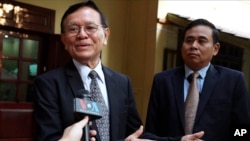The Phnom Penh Municipal Court on Tuesday said that opposition figure Kem Sokha’s treason trial was not a high priority, despite its willingness to continue legal proceedings against rights activists and dozens of former opposition members.
Taing Sunlay, president of the Phnom Penh Municipal Court, said that Kem Sokha's trial was not a priority for the court, despite calls from his defense lawyers to resume the proceedings after it was delayed last year due to the COVID-19 pandemic.
“He [Kem Sokha] is not in a detention center. So, his case is not a priority over those who are in prison,” said Taing Sunlay.
Kem Sokha was charged with treason and detained in September 2017 for allegedly attempting to overthrow the Cambodian People’s Party government, with the assistance of the United States. The trial commenced in January 2020 and was suspended in March because of the rise in COVID-19 cases in Cambodia.
His defense lawyers have asked the court to resume hearings, but judge Kuy Sao has yet to agree with them. At the same time, several of Kem Sokha’s former colleagues from the Cambodia National Rescue Party have been tried and convicted for various crimes.
Kuy Sao, the presiding judge in the Kem Sokha trial, could not be reached for comment on Tuesday.
While Kem Sokha’s case languishes in limbo, around 50 CNRP defendants will be tried for alleged conspiracy and incitement on Thursday and another 80 former party members will face similar charges in a trial scheduled for March. Both trials are linked to former CNRP president Sam Rainsy’s failed attempt at returning to Cambodia in November 2019.
In September of last year, Prime Minister Hun Sen said Kem Sokha's trial could take up to 2024, ensuring that the former opposition party president will not compete in the 2022 commune election and the 2023 national election.
Lawyers representing Kem Sokha recently asked the Ministry of Justice to intervene and speed up the trial because the court had not responded to their petitions.
Pheng Heng, one of Kem Sokha’s lawyers, said the case was politically motivated and if the trial was completed it would be possible to find a political solution or “national reconciliation.”
“We want to see a speedy trial. The court’s decision will help bring national reconciliation,” he said.
He added that he wanted the trial to end so that Kem Sokha could regain his freedom. The opposition leader is currently under court supervision and is still not allowed to conduct political activity, but has, on occasion, met with supporters during provincial visits.
Chin Malin, a spokesperson at the Justice Ministry, said the ministry had no power to “interfere” in the court’s work.
“In principle, the ministry has no power to force the court to start the trial. It is at the court’s discretion,” he said.
Em Sovannara, a political science professor in Cambodia, said all court cases must be prioritized to ensure that a citizen’s constitutionally-guaranteed fair trial rights were respected.
“Kem Sokha’s case is an important issue for the nation since it is related to the United States,” he said. “If the relations between Cambodia and the US is broken, it can affect diplomatic ties and trade relations.”
The political analyst said that if the US and EU “strongly pushed” for a resolution of the Kem Sokha case the trial could be completed before the next round of elections. It was unlikely the CPP wanted Kem Sokha to put up an electoral challenge to the ruling party’s control of the executive and legislative bodies, he added.







